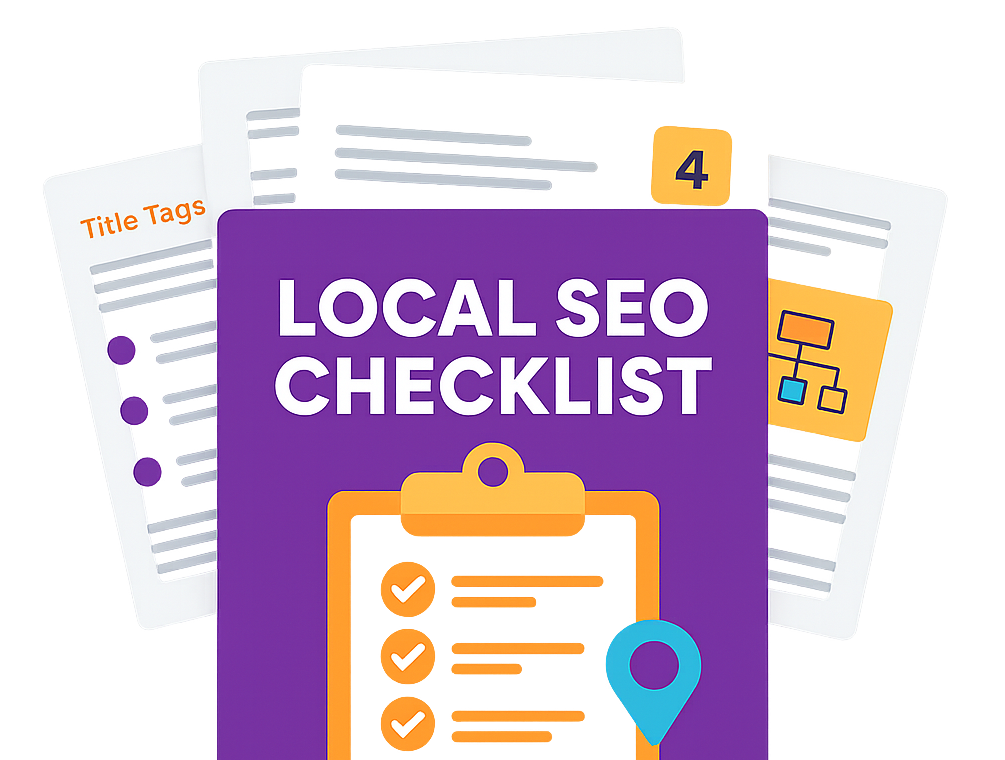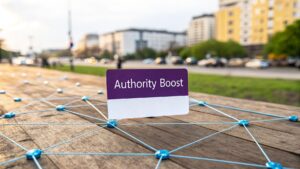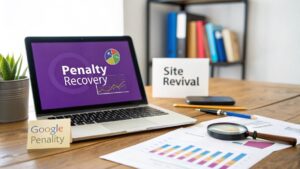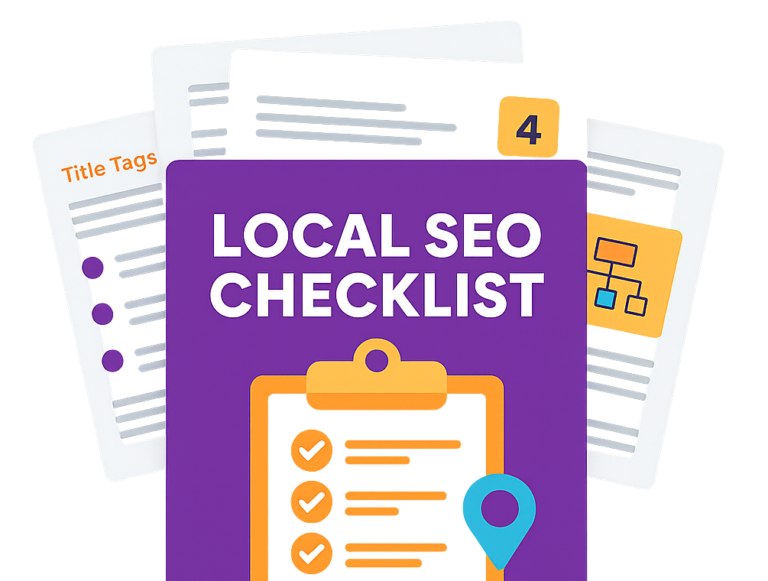In today's competitive market, being visible to your local customers is no longer an option—it's essential for survival and growth. For small and medium-sized enterprises (SMEs) across the UK, mastering local search engine optimisation (SEO) is the key to unlocking a steady stream of nearby customers actively searching for your products and services. Yet, the world of SEO can seem complex, with ever-changing algorithms and a bewildering array of tactics. Where do you even begin?
This guide cuts through the noise. We've compiled the definitive list of the top 10 local SEO strategies that deliver tangible results, from optimising your Google Business Profile to harnessing the power of local link building and voice search. Each strategy is a powerful tool in its own right, but together, they form a comprehensive framework to elevate your online presence, drive footfall to your physical premises, and significantly increase local conversions.
Whether you're a local service provider in Cambridgeshire, a high-street shop in Manchester, or an e-commerce business aiming to capture a local audience, these actionable insights will help you get found by the people who matter most. Let's explore the practical steps you can take to dominate your local search results and connect with customers right on your doorstep.
1. Google Business Profile Optimisation
Your Google Business Profile (GBP) is the cornerstone of your local SEO efforts. It is a free and powerful tool that dictates how your business appears in Google Search results and on Google Maps, acting as a digital shop front for potential local customers. A fully optimised profile provides searchers with crucial information at a glance, including your location, opening hours, contact details, and customer reviews, making it one of the most impactful of our top 10 local SEO strategies.
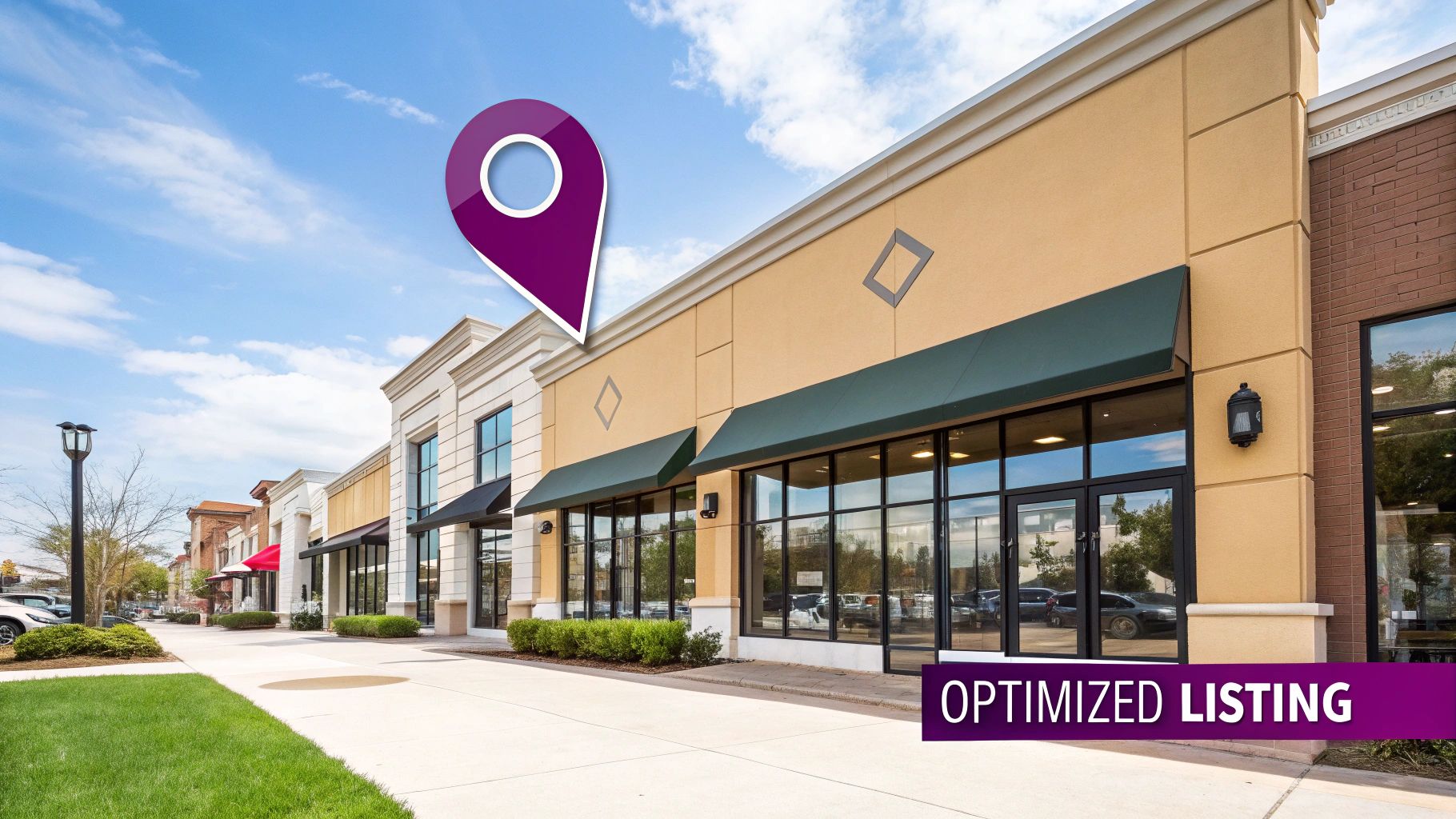
This strategy is essential for any business with a physical location or a defined service area, from a Cambridge café showcasing its daily specials to a local plumbing service building trust with before-and-after photos. Proper optimisation directly impacts your visibility in the highly coveted "Local Pack," the block of three business listings that appear at the top of many local search results.
Actionable Steps for GBP Optimisation:
To get the most out of your profile, focus on providing comprehensive and current information.
- Complete Every Section: Aim for 100% profile completion. Fill in all available fields, including services, accessibility attributes, and business description.
- Maintain NAP Consistency: Ensure your Name, Address, and Phone number are identical across your website and all other online directories.
- Engage with Reviews: Respond to all customer reviews, both positive and negative, ideally within 24-48 hours to show you value feedback.
- Upload High-Quality Media: Regularly add photos of your premises, team, and products. For brick-and-mortar businesses, consider adding a virtual tour.
- Utilise Google Posts: Share weekly updates about promotions, events, or news to keep your profile active and engaging.
2. Local Keyword Research and Optimisation
Local keyword research is the process of identifying the specific phrases and terms potential customers use when searching for businesses, products, or services in their immediate vicinity. This foundational strategy involves optimising your website's content to rank for these location-based queries, forming the very bedrock of a successful local SEO campaign and earning its spot among our top 10 local SEO strategies.

This strategy is vital for connecting with customers who have high purchase intent. For instance, a dental practice in Cambridge would target "emergency dentist Cambridge city centre" to attract patients in immediate need, while an HVAC company might focus on "furnace repair Cambridgeshire winter" to capture seasonal demand. Effective local keyword optimisation ensures your business appears precisely when and where local customers are looking for you.
Actionable Steps for Local Keyword Optimisation:
To align your content with local search intent, a targeted approach to keyword research and implementation is essential.
- Utilise Geo-Modifiers: Incorporate city, county, and even specific neighbourhood names into your keyword lists (e.g., "solicitors near Mill Road").
- Analyse Search Intent: Use Google's "People Also Ask" and related searches sections to understand the questions your local audience is asking.
- Create Service-Specific Pages: Build dedicated landing pages for each core service combined with your location (e.g., a page for "Boiler Servicing in Peterborough").
- Integrate Keywords Naturally: Place your primary local keywords in title tags, meta descriptions, H1 headings, and within the main body content.
- Track Local Rankings: Monitor your performance for both broad terms like "plumber Cambridge" and more specific long-tail keywords.
3. Online Review Management
Online review management is a crucial strategy for monitoring, responding to, and actively encouraging customer reviews across multiple platforms. In the world of local SEO, reviews are a powerful currency of trust and a significant ranking factor. Search engines like Google see a steady stream of positive reviews as a signal of relevance and quality, often rewarding businesses that manage their reputation effectively with higher visibility in local search results.

This strategy is vital for any consumer-facing business, from a local restaurant displaying positive testimonials on its website to a service-based company in Cambridgeshire turning a negative review into a demonstration of excellent customer service. By actively managing your online reputation, you not only influence search rankings but also build credibility and persuade potential customers to choose you over the competition, making it a cornerstone of our top 10 local SEO strategies. To learn more about this, explore how Online Reputation Management impacts SEO.
Actionable Steps for Online Review Management:
A proactive approach to reviews can transform them from a passive outcome into an active marketing tool.
- Respond to All Reviews: Make it a policy to reply to every review, both positive and negative. A prompt, professional response shows that you value customer feedback.
- Establish a Review Generation System: Don't just wait for reviews to happen. Implement a process to request them from satisfied customers via email, SMS, or in person.
- Address Negative Feedback Constructively: View negative reviews as an opportunity. Acknowledge the issue, apologise sincerely, and offer a solution offline to resolve the problem.
- Showcase Your Best Reviews: Leverage social proof by featuring your best reviews on your website, social media profiles, and even in-store.
- Monitor Multiple Platforms: Keep an eye on reviews across all relevant sites for your industry, not just Google. This could include Yelp, TripAdvisor, Facebook, or specialised industry directories.
4. Local Citation Building and NAP Consistency
Local citations are online mentions of your business’s Name, Address, and Phone number (NAP). These mentions, found across directories, social media, and industry-specific websites, act as digital verifications of your business's existence and location. Systematically building these citations and ensuring your NAP information is identical everywhere is a powerful signal to search engines, boosting their confidence in your data and improving your local search rankings.

This strategy is vital for establishing trust and authority, making it a key part of our top 10 local SEO strategies. For instance, a local law firm in Cambridge listed correctly in legal directories like Avvo, or a restaurant maintaining a consistent profile on Yelp and TripAdvisor, demonstrates credibility to both users and search engines. Inconsistent information, however, can create confusion and harm your visibility.
Actionable Steps for Citation Building:
To leverage citations effectively, focus on accuracy, relevance, and consistency across the web.
- Audit Existing Citations: Start by searching for your business online to find and correct any inconsistencies or duplicate listings.
- Focus on Core Directories: Ensure you have accurate listings on major platforms like Google, Bing, Facebook, and Yelp. You can learn more about how local directory submissions strengthen your online presence.
- Target Niche and Local Directories: Identify industry-specific (e.g., Healthgrades for doctors) and local Cambridge-based directories to build relevant, high-quality citations.
- Maintain Absolute NAP Consistency: Use the exact same format for your Name, Address, and Phone number everywhere, down to the last comma.
- Use Citation Management Tools: Consider using services like BrightLocal or Synup to automate the process of building and maintaining citations, saving significant time and effort.
5. Local Link Building
Local link building is the strategic process of acquiring backlinks from other reputable websites within your same geographic area. Unlike general SEO, which values links from any high-authority source, local link building prioritises relevance and proximity. Securing links from local news outlets, community blogs, or nearby businesses sends powerful signals to search engines that your business is a trusted and integral part of the local community.
This strategy is particularly effective for establishing deep local roots and authority. For example, a construction firm in Cambridge sponsoring a local football team's website, or a solicitor contributing an expert quote to a regional newspaper article. These actions not only build valuable links but also increase brand visibility and generate referral traffic, making it a cornerstone of our top 10 local SEO strategies.
Actionable Steps for Local Link Building:
Building a strong local link profile requires community engagement and creating valuable local connections.
- Sponsor Local Events: Support local charities, school fairs, or community events. Sponsorship often comes with a link from the event's website.
- Join Local Organisations: Become a member of your local Chamber of Commerce or other business associations to get listed in their directories.
- Host a Local Workshop: Offer a free workshop or event for the community. Promote it to local bloggers and news sites who may link to your event page.
- Build Local Relationships: Network with complementary, non-competing local businesses and explore opportunities for cross-promotion and website links.
- Create a Local Resource: Develop a useful guide, such as "The Ultimate Guide to Dog-Friendly Pubs in Cambridgeshire," that local bloggers and tourism sites will want to link to.
6. Location-Based Content Creation
Creating content that speaks directly to your local community is a powerful way to establish your business as a relevant, authoritative presence in your area. This strategy involves developing website content, blog posts, and resources that address local topics, events, and community interests, forming a key part of our top 10 local SEO strategies. For local SEO, focusing on effective content creation for small business success is vital to engage your target audience.
This approach helps you connect with local customers on a deeper level while signalling to search engines that your business is deeply embedded in the local market. For example, a Cambridge-based law firm could write about recent changes to local council regulations, while a restaurant could blog about its partnerships with nearby farms. This hyper-local focus attracts a highly qualified audience and builds significant trust.
Actionable Steps for Location-Based Content Creation:
To make your content a local magnet, focus on relevance and community value.
- Create Location-Specific Pages: Develop unique service pages for each town or neighbourhood you serve, mentioning local landmarks and specific community needs.
- Cover Local Events and News: Write blog posts about upcoming community festivals, charity events, or local news stories relevant to your industry.
- Develop Neighbourhood Guides: Create in-depth guides to local areas, highlighting parks, schools, and attractions to demonstrate your local expertise.
- Showcase Local Partnerships: Feature collaborations with other local businesses or suppliers, reinforcing your commitment to the local economy.
- Use Local Keywords: Research and incorporate keywords that include your city, county, or specific postcodes, such as "emergency plumber in Cambridgeshire".
7. Schema Markup Implementation
Schema markup, or structured data, is a powerful yet often overlooked strategy in local SEO. It is a form of code added to your website’s HTML that acts as a translator for search engines, helping them to understand the context of your content more effectively. By implementing local business schema, you provide specific details like your location, opening hours, and services in a language that Google can easily process and display in its results.
This behind-the-scenes optimisation can lead to significant on-page rewards, such as enhanced search listings known as "rich snippets." For example, a local Cambridge restaurant could use it to show star ratings and menu links directly in the search results, making their listing far more compelling. For service-based businesses, it can clarify their exact service area, ensuring they appear for the most relevant local queries. This tactic is crucial for earning greater visibility and a higher click-through rate, making it an essential part of our top 10 local SEO strategies.
Actionable Steps for Schema Markup Implementation:
Proper implementation ensures search engines can accurately interpret your business information.
- Implement
LocalBusinessSchema: This is the foundational markup for any local business. Ensure it includes your consistent Name, Address, and Phone number (NAP). - Use JSON-LD Format: This is Google's recommended format as it's easier to implement and maintain without altering your website's HTML structure directly.
- Add Aggregate Ratings: If you collect reviews on your website, use
AggregateRatingschema to potentially display star ratings in search results. - Define Your Service Area: For businesses without a physical storefront or those that serve a specific region, use
serviceAreamarkup to define your coverage. - Validate Your Code: Always use tools like Google's Rich Results Test to check your markup for errors before and after publishing. You can learn more about why schema markup is important for SEO on bare-digital.com to deepen your understanding.
8. Mobile Optimisation for Local Search
With the vast majority of local searches now happening on smartphones, mobile optimisation is no longer optional; it’s a critical component of any effective local SEO strategy. This approach focuses on ensuring your website delivers a seamless, fast, and intuitive experience on mobile devices, directly influencing how easily potential customers on the move can find and engage with your business. A well-optimised mobile site is essential for capturing this "near me" search traffic.
This strategy is vital for any local business, from a restaurant whose customers need to book a table quickly from their phone, to a tradesperson whose clients are looking for an emergency call-out. Google’s mobile-first indexing means the mobile version of your site is the primary one used for ranking. A poor mobile experience can therefore severely damage your visibility in local search results, making this one of our most important top 10 local SEO strategies.
Actionable Steps for Mobile Optimisation:
To cater to mobile users, focus on speed, accessibility, and user experience.
- Prioritise Page Speed: Aim for your mobile site to load in under three seconds. To ensure your mobile site loads quickly and provides an excellent user experience, consider leveraging a professional website speed optimization service.
- Implement a Responsive Design: Your website should automatically adapt its layout to fit any screen size, providing an optimal viewing experience on desktops, tablets, and smartphones.
- Simplify Navigation: Use large, easily tappable buttons for key actions like "Call Us" and "Get Directions". Keep menus simple and ensure contact information is prominent.
- Optimise Forms: Design forms for easy mobile completion. Use larger input fields, enable auto-fill, and keep them as short as possible.
- Test on Real Devices: Regularly check how your site looks and functions on various mobile devices and browsers to identify and fix any usability issues.
9. Social Media Localisation
While social media platforms aren't direct ranking factors, they create powerful social signals that can indirectly boost your local SEO. Social media localisation is the process of tailoring your profiles and content to engage a specific, geographically-defined audience. This builds a strong local community around your brand and sends relevance signals to search engines, making it a key part of our top 10 local SEO strategies.
This strategy is perfect for businesses that thrive on community engagement, such as a Cambridgeshire bookshop promoting a local author event or a fitness centre using neighbourhood-specific hashtags to attract nearby members. By geo-tagging posts, engaging with other local businesses, and sharing user-generated content, you reinforce your business’s connection to its physical location, which Google recognises as a strong local signal.
Actionable Steps for Social Media Localisation:
To turn your social channels into local engagement hubs, focus on community and relevance.
- Complete Location Details: Ensure your business address, opening hours, and service areas are fully filled out and consistent on all social media profiles.
- Use Geo-Tags and Local Hashtags: Always add a location tag to your posts and stories. Research and use hashtags relevant to your town or neighbourhood (e.g., #CambridgeEats, #PeterboroughBusiness).
- Engage with the Community: Follow and interact with other local businesses, community groups, and influencers. Commenting on their posts increases your visibility within the local digital ecosystem.
- Showcase Local Involvement: Post about local events, community news, or your team’s participation in local charity work. This demonstrates your investment in the area.
- Encourage User-Generated Content: Run contests or create photo opportunities that encourage local customers to tag your business in their posts, creating authentic local buzz.
10. Voice Search Optimisation
Voice search optimisation is the process of tailoring your content to be found through voice-activated assistants like Siri, Alexa, and Google Assistant. As these technologies become more integrated into daily life, an increasing number of local searches are happening via spoken queries, making this an essential component of any modern list of top 10 local SEO strategies. Voice queries are often conversational and carry strong local intent, such as asking for directions or business hours "near me".
This strategy is vital for businesses aiming to capture on-the-go customers. For example, a restaurant in Cambridge could be found when a user asks, "Where can I get pizza near me tonight?", or a local garage could appear for "Who fixes car air conditioning in Cambridgeshire?". As voice assistants become more prevalent, it's increasingly important for local businesses to focus on optimizing for voice search queries to secure this growing source of traffic.
Actionable Steps for Voice Search Optimisation:
To capture these conversational searches, focus on answering the questions your customers are asking.
- Answer Specific Questions: Create content that directly answers common customer questions. Develop comprehensive FAQ pages that address specific queries.
- Use Conversational Language: Write your website copy in a natural, conversational tone that mirrors how people speak, not just how they type.
- Target "Near Me" Queries: Ensure your location details are accurate and consistent everywhere online, especially on your Google Business Profile, to rank for location-based voice searches.
- Focus on Long-Tail Keywords: Target longer, more specific keyword phrases that reflect spoken questions, such as "What time does the chemist in Ely close?".
- Implement Structured Data: Use schema markup to help search engines understand the context of your content, making it easier to pull your information for voice search answers.
Top 10 Local SEO Strategies Comparison
| Strategy | Implementation Complexity | Resource Requirements | Expected Outcomes | Ideal Use Cases | Key Advantages |
|---|---|---|---|---|---|
| Google Business Profile Optimisation | Low to Moderate | Minimal (time for ongoing updates) | Improved local search visibility, increased foot traffic | Businesses with physical locations needing direct local exposure | Free tool, direct local ranking impact, customer interaction |
| Local Keyword Research and Optimisation | Moderate to High | Research tools and analysis time | Higher targeted local search rankings, better conversion rates | Businesses targeting specific local search queries | Targets high-intent local searches, builds topical authority |
| Online Review Management | Moderate to High | Time-intensive monitoring and responses | Better local rankings, enhanced reputation, increased trust | Businesses relying on customer reviews for trust and ranking | Builds credibility, improves rankings, drives conversions |
| Local Citation Building and NAP Consistency | Moderate | Time and possible subscription tools | Improved local ranking, enhanced business legitimacy | Businesses needing consistent info across directories | Boosts local rankings, supports voice search, builds trust |
| Local Link Building | Moderate to High | Outreach and relationship building | Increased local authority, referral traffic, better rankings | Businesses aiming for local backlinks and community presence | Builds local relevance, easier local link acquisition |
| Location-Based Content Creation | High | Content creation resources | Establishes topical authority, increased organic visibility | Businesses wanting to engage local audiences via content | Engages community, supports long-tail keywords, brand awareness |
| Schema Markup Implementation | Moderate to High | Technical knowledge or developer help | Enhanced search result appearance, better search understanding | Businesses with multiple locations or rich attributes | Improves rich snippets, supports voice search, competitive edge |
| Mobile Optimisation for Local Search | Moderate | Development and ongoing testing | Better mobile user experience, increased conversions, mobile-first indexing | Businesses with mobile local search users | Captures mobile intent, reduces bounce, enhances local journey |
| Social Media Localisation | Moderate | Content creation and management | Increased local engagement, social signals, brand awareness | Businesses active on social platforms targeting local customers | Builds community, generates social signals, customer service |
| Voice Search Optimisation | High | Content strategy and technical adjustments | Captures emerging voice traffic, improved featured snippets | Businesses targeting voice/local “near me” queries | Future-proofs SEO, captures conversational local queries |
Putting It All Together: Your Path to Local SEO Success
You have now explored the landscape of local search and are equipped with a powerful arsenal of the top 10 local SEO strategies designed to elevate your business's visibility. From the foundational necessity of a perfectly optimised Google Business Profile to the forward-thinking approach of voice search optimisation, each tactic is a vital component in constructing a dominant local digital presence. The journey to the top of local search results is not about a single, magic solution; it is built on the consistent and strategic implementation of these interconnected methods.
Key Takeaways for Sustainable Growth
The overarching theme across these strategies is simple: trust and relevance. Google's primary goal is to provide users with the most accurate and helpful local results. By focusing your efforts on the following core areas, you align your business with this goal:
- Consistency is Crucial: Ensuring your Name, Address, and Phone number (NAP) are identical across all platforms, from your GBP to local directories, builds a foundation of trust with search engines.
- Engagement Matters: Actively managing online reviews and engaging with your local community on social media sends powerful signals that your business is active, reputable, and values its customers.
- Content is Context: Creating location-specific content, whether through blog posts about local events in Cambridgeshire or service pages tailored to specific neighbourhoods, demonstrates your relevance to the local market.
- Technical Foundations are Non-Negotiable: A mobile-friendly website and the correct implementation of schema markup are no longer optional extras. They are essential for providing a seamless user experience and helping search engines understand your business.
Your Actionable Next Steps
Feeling overwhelmed by the list is natural. The key is to avoid trying to implement all ten strategies at once. Instead, adopt a methodical, phased approach to make tangible progress.
Start by conducting a quick audit. Where are your biggest gaps? For most SMEs, the most impactful starting points are:
- Perfect Your Google Business Profile: This is your digital shopfront. Fill out every section, add high-quality photos, and start actively using features like Google Posts and Q&A.
- Systemise Your Review Management: Create a simple process for requesting and responding to customer reviews. This is one of the most powerful forms of social proof you have.
- Check Your NAP Consistency: Use an online tool or manually check your top 10-15 citations to ensure your core business information is completely consistent. Correct any discrepancies you find.
By mastering these foundational elements first, you create a solid base upon which to build more advanced tactics like local link building and schema implementation. Remember, local SEO is a marathon, not a sprint. Consistent, focused effort over time will yield the most significant and lasting results, transforming your online presence from a passive listing into a powerful customer-acquisition engine. You are not just chasing rankings; you are building a more resilient and profitable local business, poised for sustainable, long-term growth.
Navigating the complexities of these top 10 local SEO strategies can be a significant undertaking for any business owner. If you're based in Cambridgeshire or beyond and want expert guidance to accelerate your growth, our team at Bare Digital is here to help. We specialise in creating bespoke local SEO campaigns that drive measurable results.
Ready to uncover your biggest opportunities? Request your FREE, no-obligation SEO Health Check today and receive a clear, actionable plan to start climbing the local rankings.


